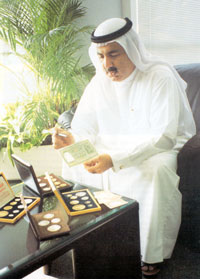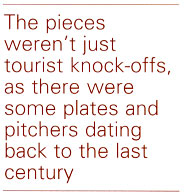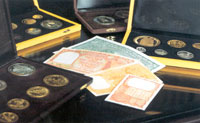|
There’s a family in Sharjah with a peculiar habit passed from one generation to the next. They suffer from a serious predilection known by experts as collectivitis, and they admitted to Al Shindagah that… My senses are easily seduced by the musty mysteries of a good antique shop, so I succumbed to the pleasures of wandering and touching. I rounded a tall stack of old mandoos chests while examining the intricate carving when I stumbled clumsily into a table heaped with stacks of plastic cards. They tumbled in all directions and I mumbled embarrassed apologies to the young Emirati who had been absorbed in sorting them. He laughed when we nearly knocked heads bending to retrieve the multi-colored disarray scattered across the floor. That was how I met Taleb Mohammed Nasir whose family owns Gulf Antiques, one of the earliest collectibles stores of the Emirates. Taleb brushed off my mea culpas, but as penance insisted that I join him for very sweet tea summoned from the recesses of the souk. Meantime, he set about righting the havoc which I had caused to what was evidently a collection of every known variety of GCC telephone cards. At the same time he adroitly managed to learn all the details of my nationality and work and interests. (I wondered if the mental scanner examining me would start to beep loudly if I was recognized as being notoriously tight-fisted.) I complimented the variety of Gulf antiques displayed helter-skelter in the nooks and crannies of the shop. Taleb explained that the business was started by his father, and that the store is now managed by his older brother, a bank officer. I watched as Taleb continued shuffling the rainbow-hued cards like some sort of telecom croupier, and I commented about the size of his collection. “Oh this is nothing!” he exclaimed. “I’ve got thousands more from all over the Gulf. I’m just taking care of the store for my brother while he’s away; what I really enjoy is working on my collections.” The shiny cards seemed out of kilter with the antiques stacked around us. “Yeah, that’s right, but I’m not into the local stuff, “ he laughed. “You should see my collection of Coca Cola memorabilia. I’m the first Arab member of their international society of collectors. Coke always requests me to display at their exhibitions or conferences because I’ve got all the historic bottles, mementos and advertisements used from the beginning in this region. I get requests all the time over the Internet from collectors who want to trade with me.” I observed that he and his brother seemed to share a weakness for collecting. Taleb laughed, “That’s right, I’m afraid that collecting is in our blood. It’s not just the two of us, it’s affected many in our family. We must have picked up the bug from our father Mohammed. He still keeps himself busy over at his own shop. Go over and talk with him there, and call up my brother at his bank. They’ll be more than happy to talk to you.”
“How did I get started on this? Sharjah used to have the only airport of the Northern Emirates, and the British Royal Air Force had lots of personnel stationed here or passing through. Some forty years ago I was buying the cars of RAF officers when they left, their old Land Rovers and such. I was giving away things like coffee pots that their families wanted as souvenirs, and I came to realize that the materials our people were throwing out as junk were valuable!” A portly German matron and her son came in and greeted Mohammed like long lost friends. They asked to look through his old beduoin jewelry made with Maria Theresa silver coins, so the proprietor set one of his assistants on the trail of several boxes stashed into the remote corners of the cramped shop. He turned back to me and sat down behind the counter. “Now let’s see, where were we? I began to travel around the villages with one or two of my sons and we started to buy the old belongings when families wanted to get rid of them, their kitchen utensils and clay pots, the mandoos chests. We even bought old hardwood doorways when people replaced them with modern metal doors. “I opened the antique store here to sell those goods to foreigners. Along the way, I learned to appreciate our old Emirati heritage, and I began to keep some of the best items for my own collection. The store was more of a hobby than anything else. My shop was the first antiques business in the country and it became well-known to those selling and those buying. We’ve been lucky to make lots of friends from all over the world.” Days later I was mulling over those words and the image they evoked of the simpler era before the Emirates merged into the fast lane. I was seated in the anteroom of the General Manager’s office suite at the National Bank of Abu Dhabi, in one of the tallest skyscrapers along the crowded shoreline of the Khalid Lagoon. Supplicants were ushered in and out across the thick carpet. A battalion of secretarial fingers clicked across keyboards to provide the syncopated soundtrack of the hushed environs. Gone were the days of old scribes scratching transactions into the dusty ledgers of souk money changers. My turn for an audience arrived, and I was motioned into the General Manager’s presence. I didn’t know whether to genuflect or curtsy. I hesitated for a beat, but Ahmed Mohammed hustled from behind his imposing desk to welcome me. He steered me away from the knock-knee chairs near his desk towards the more plush seating overlooking the imposing view of Sharjah’s lagoon. The harried manager sighed as he sunk into his chair. “It’s been a difficult morning. I’m terribly sorry to have kept you waiting, but I thought you should be last so that we could relax and talk without being interrupted.” Refreshments were summoned, along with the provocative instruction, “…and bring the UAE gold collection!” Ahmed had a glib and easy-going manner that totally belied the office designed in typical banker fashion to subtly intimidate. “So you’ve been talking already with my father and my brother. I understand that you’re curious about our strange habit!” Ahmed grinned broadly and I realized that the family charm must be as hereditary as the collecting. Meantime the secretary was spreading an array of boxed coins and various currencies across the coffee table. The afternoon sun glinted provocatively on the scattered yellow metal. The banker’s hands fluttered across his collection, adjusting the position of the coins, reordering the denominations of some multi-hued paper notes. “This is why I collect currency. They’re beautiful, aren’t they? I specialize in every issue that’s been used in the United Arab Emirates. It’s our heritage, these coins tell the story of our past.” Ahmed surveyed the display as he considered my initial question regarding the origins of his collecting. “I started because I felt a bit jealous. That sounds odd, but it’s true. I used to go out to buy old things with my father, and it was always the foreigners who were buying them and taking these beautiful bits of history out of the country. Why were these strangers interested in our heritage, but our people weren’t? So I started to keep some of the old coins and notes to start my own collection.”
After the proclamation of independence and the establishment of the federal union, the UAE Currency Board was officially instituted in 1971. Thomas de la Rue Company, one of the premier currency printers in the world, was commissioned to design and print the coinage and notes of the new UAE Dirham. Ahmed’s laughter rang out in the ‘ now silent office, where everyone else had disappeared for lunch. He pooh-poohed my concern that I was delaying his own meal and picked up a set of gold coins of different sizes. “This is something else that is special. Each of the governments in the UAE occasionally issues commemorative coins, and this is a complete set. They only release a limited number, so it’s a matter of short supply driving up the price of demand.” “Collecting is actually a skill that needs to be learned, so inevitably there will be some mistakes. On one occasion you might pay high money and after you go through the books, or as time goes on, you realize that it’s useless. On other occasions you might buy some coins or notes for next to nothing and discover later that they are worth too much!” The fraternity of serious numismatists in the UAE is small, with only ten to fifteen serious collectors. A few of these dedicated collectors are active, bidding in international auctions, trading with recognized collectors elsewhere in the world, and attending the big annual shows. “For example, whenever I’m in London,” Ahmed confided, “I am in contact with certain reputable dealers there, and they notify me when an item that I have been searching for becomes available, or when an entire collection is being auctioned, which is always exciting. “Look at the Qatar and Dubai Rial which was in use just thirty years ago. Now the 1 rial note is worth 200 AED if it’s in good condition, the 5 rial is worth up to 500 AED, and the more rare 25 note is worth up to 6000 dirhams. The original value of that 25 rials was about six or seven US dollars. Anyone who would have kept some of those notes in good condition during the past decades would now take almost two thousand dollars per. That’s an excellent investment!” Ahmed looked up from the items on the table and beamed as though all was right with the world. “The trick is to get a feel for what will appreciate in value. The good collector will take first issues of currency notes and stamps, and preserve them in an environment with good air. They shouldn’t be touched too frequently, as fingers always leave a residue of oil which deteriorates the paper. As time goes on, you build up a stock of material, and watching the auction houses you get a sense of what is appreciating and what isn’t. You develop professional liaisons with other collectors, and arrange trades with some extra item that you’ve got in stock in order to plug a hole in your collection.” One of the most enjoyable aspects of the raven’s habit is its potential for surprises. Ahmed shared a story about another one of his collections, the local mandoos chests used as storage containers for clothing or bedding or documents. “I’ve been collecting mandoos for many years. They come in different patterns and designs and types of wood, so every single one is unique. I really love them; they tell fascinating stories about our local history. “One day I pulled an old chest out of a storeroom because I wanted to use it as decoration in my house. I like doing the restoring myself, so I applied the chemical to take off the layers of old paint and grime and then began scrubbing down to expose the natural wood. I discovered a drawer that was so well hidden it had been painted over. I’m sure that it had been forgotten when the mandoos was passed from one generation to the next. I managed to pry it open, and after removing some padding, lo and behold I found some gold coins! They were on top of some papers, one of which was even better than the gold, as it was an important historical document.” Ahmed’s eyes sparkled, reminding me of a youngster happily enjoying an unexpected gift. “What a surprise! That’s one of the nice benefits of collecting.” A mobile phone on the coffee table began to vibrate against the glass, and the coins started chattering among themselves. Ahmed looked at the number display to see if he could ignore the call, but this time he decided not to. After a sotto voce consultation, he looked up at me and shrugged. “That was the Minister of Interior, wondering when I’ll be home for lunch.” I started making the motions of getting ready to leave, but Ahmed motioned me to stay seated. “I’ll tell you one more story and then we’ll have to stop. My sons are starting to show the symptoms of our family habit, and like my father teaching me when I was young, sometimes I take the two older ones, Nasir and Mohammed, when I go places to buy and sell. Their eyes are good, maybe too good! They watch me stash coins here and there in secret hiding places at home. “Once I had someone interested in a rare gold coin, and I turned our house upside down looking for it. One of my boys was watching me, and he asked me, ‘My father, what are you looking for?’ I was nervous and in a rush, so I just replied, ‘Something small, go out and play.’ My boy kept on following me and started to giggle. ‘Which one of the gold coins are you looking for?’ That stopped me in my tracks. He piped up again, ‘What color is the box?’ I was beginning to feel the years go by faster. ‘The burgundy one…’ My little boy then casually announced, ‘Oh I know where it is. You should have asked me!’ He went behind a big mandoos and reached into a hidden cranny in the wall and pulled out the very box I had been searching for. I didn’t know whether to laugh or to worry about becoming an old forgetful man so soon!” The sun angling through the windows caught the happy pride in Ahmed’s eyes as he started closing and securing the display cases of his collection. As the sparkling coins disappeared from view, I felt an involuntary twitch of disappointment that apparently there weren’t any extra specimens to be shared. Mallesh… I thanked the banker for his time, wishing him the best of luck with his ambitious enterprise, and sent my greetings to father and brother and the new collectors coming up in the next generation. l |
 I was trolling the byways of the restored Sharjah souk to see what odd flotsam might be discovered at the antique shops. My skeptical eye scanned the display in one large window of typical daggers and brass coffee pots, but amongst them I was surprised to notice a fine set of British china royal memorabilia. The pieces weren’t just recent tourist knock-offs, as there were some plates and pitchers dating back to the last century. I was intrigued and pushed open the creaking door to enter the shop.
I was trolling the byways of the restored Sharjah souk to see what odd flotsam might be discovered at the antique shops. My skeptical eye scanned the display in one large window of typical daggers and brass coffee pots, but amongst them I was surprised to notice a fine set of British china royal memorabilia. The pieces weren’t just recent tourist knock-offs, as there were some plates and pitchers dating back to the last century. I was intrigued and pushed open the creaking door to enter the shop. It took some searching to locate the family patriarch among the Indian knick-knack peddlers and the Afghani carpet showrooms at Sharjah’s old souk on Khalid Lagoon. I located the dean of Gulf antiquarians in his hodge-podge raven’s nest of local heritage. Abu Ahmed peered over his bifocals at me as I introduced myself and indicated my curiosity about his collecting habit.
It took some searching to locate the family patriarch among the Indian knick-knack peddlers and the Afghani carpet showrooms at Sharjah’s old souk on Khalid Lagoon. I located the dean of Gulf antiquarians in his hodge-podge raven’s nest of local heritage. Abu Ahmed peered over his bifocals at me as I introduced myself and indicated my curiosity about his collecting habit. I asked if the banker could explain the history of UAE coinage. “The currencies used in the UAE during the past half century are fascinating. Back in the forties and fifties, what commerce there was had been handled with rupees from the Raj in India and a mix of other currencies like sterling. Then in the late fifties, the UK decided to commission a special issue rupee for their dependencies in the Gulf.”
I asked if the banker could explain the history of UAE coinage. “The currencies used in the UAE during the past half century are fascinating. Back in the forties and fifties, what commerce there was had been handled with rupees from the Raj in India and a mix of other currencies like sterling. Then in the late fifties, the UK decided to commission a special issue rupee for their dependencies in the Gulf.”